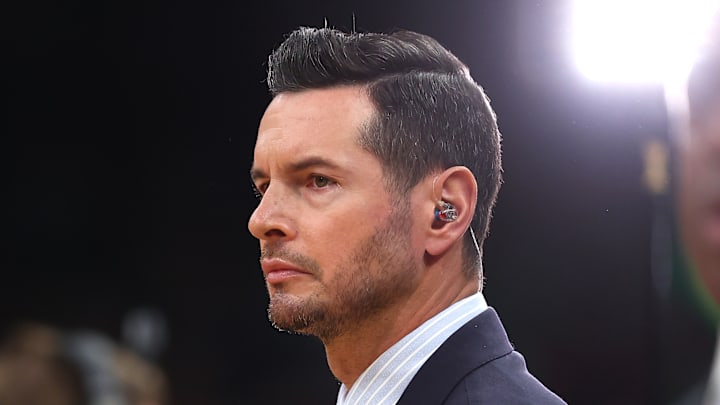After months of flirtation and a few spicy podcasts with LeBron James, JJ Redick officially interviewed for the Los Angeles Lakers vacant head coaching job over the weekend. The former NBA player turned podcaster turned broadcaster turned LeBron-BFF has been on a meteoric rise through the media industry, and is now on the cusp of bypassing the NBA coaching ladder altogether
It’s fair to question Redick’s qualifications to helm an NBA sideline, he has zero coaching experience, but it is not without precedent. The NBA’s final player-coach was Dave Cowens during the 1978-79 season. Since then there have been 16 instances of an NBA head coach taking over without any prior high-level coaching experience. Starting with Paul Silas in 1980 and ending with Steve Nash in 2020, an NBA franchise has bet on a completely unproven head coach once every two and a half years, which makes us a year and a half overdue for the next coaching neophyte.
How first-time coaches have faired as head coaches
The success rate for NBA coaches who completely bypass the resume-building phase of their coaching career has been a mixed bag. Only two coaches won a title during their careers, and only one won with the team that hired them proverbially off the street. Far more saw their coaching careers end completely or were sent back to the assistant coach jungle.
The average coach in the sample lasted 2.75 seasons with the team that hired them initially, won 51.85 percent of their games, made the playoffs 1.4 times, and won 2.1 playoff series. However, two names are doing most of the heavy lifting.

Steve Kerr and, to a lesser degree, Larry Bird are dragging the performance of this sample up. The two combined have 30 of the 34 playoff series wins and own, by far, the best win percentages. Kerr and Bird represent the best possible outcome when hiring a head coach without coaching experience, but they’re not completely representative of the larger sample. Kerr was the general manager and president of basketball operations of the Phoenix Suns from 2007 to 2010, and Bird was a special assistant for the Celtics between 1992 and 1997.
Not to be forgotten, Isiah Thomas was also an executive before entering the head coaching ranks, running the Toronto Raptors from 1994 to 1997, and while he wasn’t nearly as successful as Kerr and Bird, he had a relatively successful first stint as a head coach. M.L. Carr was also an executive before taking over the Celtics, but he effectively hired himself as the franchise embraced a rebuild. If you remove those four from the sample, suddenly, the picture becomes much more bleak.

The average winning percentage drops from 51.85 percent to 45.41 percent, the average number of playoff appearances drops from 1.4 to 0.92, and the average number of playoff series won drops from 2.125 to 0.33. In short, going from a front office to the sidelines seems to be an easier transition than going from the golf course or broadcast booth.
Front-office experience undoubtedly aided Kerr, Bird, and Thomas, but they also took over strong teams. The Warriors were 51-31 with a young Stephen Curry, Klay Thompson, and Draymond Green before Kerr took over, the Pacers, despite Mark Jackson missing 50 games, went 39-43, well below their expected record of 44-38, before Bird arrived, and Thomas inherited a 56-win Pacers team from Bird. Carr’s is an unusual situation, and he is the only example where an individual effectively hired himself.
How first-time coaches changed their teams in year one
When judging a coach's impact their overall record might not be the best barometer. A 41-41 season might be a tremendous improvement. It may be a significant step back. What matters is what transpired the season before. In general, first-time coaches made little to no impact on their team’s fortunes, with teams’ winning percentages improving by 0.68 percentage points, equating to approximately an extra half-win.

Once again, Kerr and Bird carry a lot of weight, but there are a few examples of other first-time coaches raising their team’s level. Dan Issel, Vinny Del Negro, and Steve Nash immediately improved their teams to above .500 (Dick Van Arsdale only coached 26 games as an interim), but for the most part, franchises that gambled on a first-time coach saw their fortunes take a turn for the worse.
Could JJ Redick buck history in Los Angeles?
What does this mean for JJ Redick and the Lakers? Well, if history is any indication, he’ll likely struggle to make an immediate impact in Los Angeles. Coaches with no coaching experience don’t tend to catapult their teams forward early on, and even if they become well-regarded head coaches, it usually takes multiple seasons for them to hone their craft. The majority of first-time coaches saw their teams get worse in their first season, with Steve Kerr and Larry Bird dragging the average up.
On top of that, the Lakers have all the markers of a team that will decline. Their 47-35 record outperformed their expected record of 42-40 based on point differential, LeBron James and Anthony Davis played in their most regular season games since 2017-18, they are one of the oldest teams in the league and don’t have any young players poised to take on a larger role. Barring significant roster adjustments, the Lakers are built to be a .500 team.
JJ Redick could be the next Steve Kerr, Doc Rivers, or even Jason Kidd, but none of them could turn this Lakers team into a serious championship contender. With all signs pointing down in Laker-land, Redick coming in and keeping the Lakers at 47-35 would be an impressive accomplishment. Hiring a first-time coach isn’t a surefire debacle, but it’s not some secret ticket to contention either. Like most coaching hires, the quality of the coach is unknown until it’s known, and the roster matters most in the win column.
